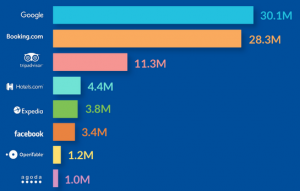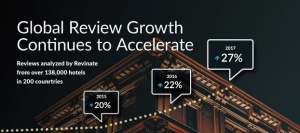Going into 2020, hotels and hospitality brands must stay informed of consumer behavior shifts, in particular when it comes to digital marketing and evolving popular platforms. One thing, however, that has not changed much in the past 15-20 years or so – or rather, that remains as strong if not stronger – is the importance of online reviews in the decision marking process.
In fact, a survey by Ipsos conducted earlier in 2019 with over 23,000 TripAdvisor users confirmed that traveler reviews remain a go-to source of information, with 72% of respondents always or frequently reading reviews before making a decision on places to stay and eat, or things to do. The figure is even higher when it comes to accommodation bookings, with four out of five participating travelers (81%) always or frequently reading reviews before booking a place to stay.
I have written on many occasions about this topic here on this blog, and have given keynotes and workshops as well. The following infographic by the folks at MaidenStride does a good job of summarizing opportunities and challenging that come with online reputation management, as well as highliting key steps in a basic ORM strategy:
- Respond quickly
- Keep a professional tone
- Thank the person by name
- Apologize for the inconvenience, if the experience was negative
- Create original responses
- Highlight positive changes and updates
- Show gratitude
- Be careful with privacy
- Consider following up
How important are online reviews for your business? Be sure to monitor not only TripAdvisor and popular OTA sites (Expedia, Booking) but also Google reviews, via Google My Business, and social media accounts like Facebook, Instagram and Twitter, perhaps even Linkedin.










Leave a Reply